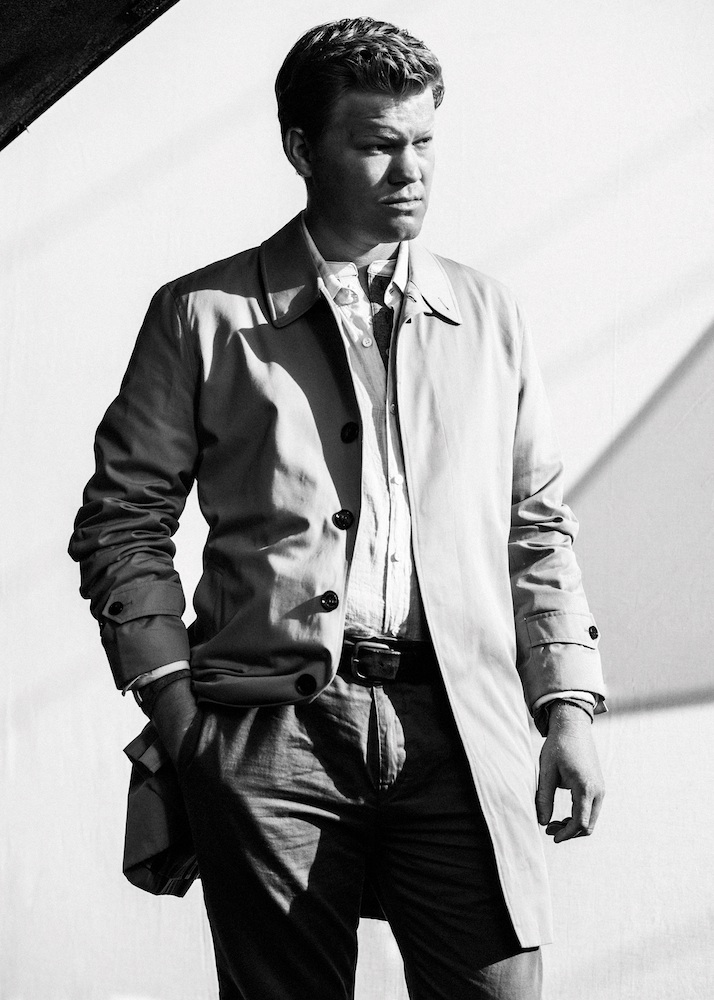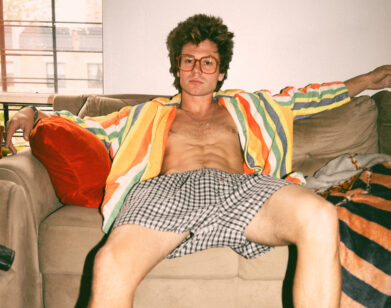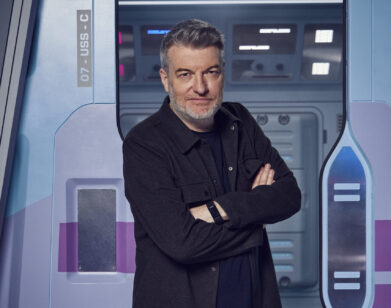Jesse Plemons
JESSE PLEMONS IN LOS ANGELES, AUGUST 2015. PHOTOS: BRIAN HIGBEE. STYLING: LAURA MAZZA. GROOMING: CATHERINE FURNISS FOR ART DEPARTMENT USING KEVIN MURPHY HAIR CARE.
If there is any quality that connects Jesse Plemons‘ characters, it is sincerity. Whether he’s playing a nerdy Texas high school student, a ruthless murderer, the son of a cult leader, a bumbling Minnesotan butcher, a Mennonite cyclist, or Whitey Bulger’s henchman, you believe in his characters’ choices; not necessarily that they are making the right ones, but that they think they are making the only choice at that moment. Often, it makes you root for his characters—Plemons’ performance as Landry in Friday Night Lights anchored the show—or at the very least, you understand them.
This autumn, Plemons is promoting three new projects. First up is Black Mass, the Whitey Bulger biopic helmed by Johnny Depp. As mobster Kevin Weeks, Plemons is physically transformed: gone are his strawberry blond hair, trim figure, and Texan lilt; instead, the 27-year-old is a burly mop of brown curls and South Boston pugnacity. Weeks might not seem like the brightest tool in the shed, yet he managed to get out of a career of criminal activity with a five-year prison sentence and a book deal, and Plemons finds that balance.
In the new season of Fargo, Noah Hawley’s delightful dark drama inspired by the tone and setting of the Coen brothers’ film, Plemons is transformed yet again. Playing the local butcher’s assistant Ed Blomquist, his brusque bulk becomes a placid portliness; his Boston mumble a polite Minnesotan accent peppered with “huns” and “jeez” and “you betchas.” Like Weeks, Blomquist has a provincial air to him—albeit a much more pleasant one—but when it comes to working the meat grinder (beef or otherwise), he does it with a cold efficiency.
Then there is Stephen Frears’ Lance Armstrong biopic The Program, in which Plemons plays disgraced cyclist Floyd Landis. You shouldn’t sympathise with Landis—he’s a fallen hero, a cheat—but you do, and it’s because of Plemons’ performance.
Here, Plemons talks to his friend and The Program co-star, French actor Denis Ménochet.
DENIS MÉNOCHET: Yo, buddy. What’s up?
JESSE PLEMONS: Oh, you know. I have a scheduled chat with you today.
MÉNOCHET: I know. Am I late?
PLEMONS: No, you’re good. Right on time.
MÉNOCHET: [laughs] Don’t be polite with me. How’ve you been?
PLEMONS: Good, man. Just got back from Toronto and Boston for Black Mass.
MÉNOCHET: How was that?
PLEMONS: The reception was good. I was pretty nervous for Boston. Obviously people are going to watch it in a completely different way there because they grew up with it. It was good.
MÉNOCHET: What you did, I was blown away. It’s amazing.
PLEMONS: It’s pretty ugly.
MÉNOCHET: [laughs] You’re in character.
PLEMONS: It felt right.
MÉNOCHET: So I was thinking for this interview about when we first met. It was in the Alps shooting the Stephen Frears film The Program. You’d just come back from training and we talked about acting.
PLEMONS: [Chris] O’Dowd was there too, right?
MÉNOCHET: Yeah!
PLEMONS: And Stephen came in and had some little quip and then exited.
MÉNOCHET: This is where you came up with the nickname “Yo Yo” for me that sticks with me forever now. Everyone calls me “Yo Yo.”
PLEMONS: I know. Are you annoyed about it, Denis?
MÉNOCHET: No. Not really. It’s very funny. I love it. Do you remember when you knew you wanted to be an actor?
PLEMONS: Yes and no. As a kid, it was something that was available. It was way more exciting than anything that was happening at school, and it was also a way to get out of school. I did a Coca-Cola commercial when I was about two-and-a-half years old, and then me and my family were extras in a bunch of Westerns. I loved dressing up and stepping into this imaginary world, and it was fun to get outside of my tiny little town with a bunch of movie weirdos.
MÉNOCHET: Did you watch films as well?
PLEMONS: Yeah. Lonesome Dove was the movie. I watched that over and over and over again, and I know every line. It was one that I loved as a kid for all the horses and characters that went over my head, but then the older I got, I realized how amazing it was on so many other different levels—Robert Duvall and Tommy Lee Jones’ relationship. I think it’s one of the best Westerns ever. It’s not your typical shoot-’em up movie. It’s a character study.
MÉNOCHET: Have you been acting all your life, man? What jobs did you do besides acting?
PLEMONS: I worked on a ranch when I was 16 years old, and my dad kept me fairly busy around the house, but that’s pretty much what my life has been.
MÉNOCHET: In a world where money doesn’t exist, what would be your dream job?
PLEMONS: That’s a good question.
MÉNOCHET: I worked hard on this!
PLEMONS: I want to ask you all these questions too. A world where money doesn’t exist, that would change a lot of things. I honestly think it would probably be what I’m doing. It would probably free things up to where I could really focus on music as well. It’s a fun way of collaborating.
MÉNOCHET: Yeah, I don’t blame you. I love what we do. What’s the last picture you took with your cellphone?
PLEMONS: Let me see. Hold on.
MÉNOCHET: [laughs]
PLEMONS: It’s a picture of—well, I don’t know if she’s actually my goddaughter, but it seems like she is—one of my best friends, Jazz, her three-and-a-half year old Ava, that lives in my place in Austin. I took a picture of her when I got back, sleeping, just because I couldn’t believe how long and tall she is.
MÉNOCHET: How do you feel about acting today? Because you’ve been working non-stop recently and you’ve been back to TV with Fargo. Did you notice any changes or evolutions in what you do?
PLEMONS: I think that’s what I’m trying to pin-down. It seems like it’s constantly evolving, and what worked for me as an 18-year-old, it doesn’t work in the same way now. With every new part, you definitely fall back on some things, some methods that have worked in the past, but it’s always, for me, trying to find the most exciting way into a part or a story. A part that’s going to pick as much in yourself as possible, and just the one that’s going to be the most fun.
MÉNOCHET: It’s like you developed this sort of instinct when you’re on set after a while—like making notes on the guitar and notes are coming up together well. I think it’s the same kind of instinct.
PLEMONS: The frustrating part of it is you can do all this work, you can have all these things in your pocket to fall back on, but if you’re not truthful about what’s happening on the day, in the moment, what you’re feeling when you’re actually there, then it’s all kind of for nothing. It’s finding that balance of preparation and then just letting it all go. That’s what everyone always says, but that’s why. That’s the toughest challenge.
MÉNOCHET: Yeah, it’s not that easy. Have you ever been pulled over by a cop? Why?
PLEMONS: I have. [laughs] In Texas, cops are sort of…well, maybe I shouldn’t say this. I’ll make myself a target. The one that comes to mind was in Austin. I was taking a break from drinking—it had probably been a month or so—and I had a few glasses of wine. I hadn’t eaten anything and I was definitely fine. I was crossing into Austin over the bridge there driving my car, a ’69 Skylark, and they pulled me over and I did the whole field sobriety test. I really didn’t know. I was like, “I don’t think I’m drunk, but it’s been so long since I’ve drunk anything.” So I just totally accepted that I was going away forever. I was like, “Okay, I’ll do your test and you can take me to jail.” And then I passed! It was great!
MÉNOCHET: No way! [laughs] You’ve been portraying real-life people lately, how is that different than when you are creating a fictional character?
PLEMONS: It feels completely different in the beginning, and it’s something that I’m still trying to figure out. There’s obviously a different level of responsibility. I answered that question a lot in Toronto and Boston for Black Mass—
MÉNOCHET: Yes, tell me how you did that for Black Mass and Kevin Weeks, because the Boston accent is a lot. How did you approach that?
PLEMONS: I made myself crazy obsessing over every little detail in the beginning, gathering information. You have the script, but in the scheme of the 25-year story and everything that’s been written about these guys, that’s a tiny little sliver of the big picture. I immediately bought Black Mass, the book, and Brutal, Kevin Weeks’ book, and reading that was extremely helpful. I started with the boxing training, because he says in his book that from the time he could make a fist, he was boxing. His father was a professional boxer; his brother was a boxer. And there’s a big fight scene in the movie, so that was one thing where I was like, “I can’t look like an idiot when I’m fighting. I have to look like I know what I’m doing.” That was every day for three weeks or so. Then one of the other actors [Rory Cochrane] who plays Stevie Flemmi, I met him and all he wanted to do was get to South Boston and explore, and I was like, “Well, I’m in.” I think the first or second day that he was there, he ran into this guy who is from South Boston, but Rory met him at this boxing gym in L.A. He became our tour guide, our South Boston liaison.
MÉNOCHET: And the Boston accent?
PLEMONS: We had dialect coaches, and that was definitely a great help, but I get overwhelmed learning all of the rules, so I found this one interview of Kevin Weeks on Greater Boston. I watched it over and over and over again. I transcribed the interview out. Most of the sessions with the dialect coaches were either going over this interview to get his rhythm down and his specific type of dialect, or reading his book out loud in the dialect. It’s just obsessing over it. You know that’s going to be one of the things that people from Boston immediately either buy or don’t. It was just a lot of time.
MÉNOCHET: Sponging. You sponged it.
PLEMONS: Yeah.
MÉNOCHET: Name the last three songs you’ve listened to.
PLEMONS: “Open the Door, Homer” by [Bob] Dylan. That’s off of The Basement Tapes, this album he made with The Band when he had decided to hole-up in Woodstock. I love those recordings. The atmosphere in those recordings, you just feel like you’re right there. That’s the only one I can think of recently.
MÉNOCHET: Which song would best describe you? For me it would be either “Wild Horses” from the Rolling Stones or “Smelly Cat.”
PLEMONS: [laughs] Or what?
MÉNOCHET: [laughs] “Smelly Cat.” Because you’re my smelly cat when you live with me in London.
PLEMONS: I like yours. I would go for that.
MÉNOCHET: Can you talk to me about music? I know that music is in your blood; your father plays guitar and you’re a great guitarist, and people don’t know that. You’re a songwriter and you had a band.
PLEMONS: I grew up with a limited knowledge of music. I grew up listening to whatever was playing on the popular modern country stations at the time, so it was a lot of George Strait. There are early videos of me at three-years-old with a tiny guitar trying to sing “Friends in Low Places” by Garth Brooks. It was something I responded to pretty early on. I guess I thought that’s what music was for a long time—country music. And all of the songs that my dad played; he played a lot of James Taylor and some bluegrass. Then when I was around 18 I moved to Austin. I got my first real guitar when I was 16 and finally just decided I was going to learn how to play. I remember thinking, “Well, I’ll never been any good at it, but that’s okay. I enjoy it.”
MÉNOCHET: You’re very good at it. Believe me.
PLEMONS: Yeah, but it’s the same as anything. One of my good friends Alex—I was living with him at the time—is this Canadian who plays guitar. And I remember thinking, “Wow, I will never be as good as him.” Then all of a sudden we saw each other a year later and I’m playing along with him. But moving to Austin, I met Stephanie Hunt, who played my bass player in Crucifictorious on Friday Night Lights. She’d been living in Austin for a long time playing in various bands—she played in this band T Bird & the Breaks—and she introduced me to this world of musicians. It just blew my mind how talented these people were and how that was all they did every day, just sit in their rooms and play guitar or keyboard or whatever. I finally started looking back at music in the ’60s and ’70s and discovered songwriters like Townes Van Zandt and Leonard Cohen and obviously got obsessed with Dylan. I couldn’t believe that you could do that with music, because I’d pretty much only been exposed to popular country music. It became a mode of exploring different things in myself and enjoying the idea of putting together this little puzzle and trying to write something that connects people to what you’re saying. It’s anything you want; it’s a blank canvas there and it’s totally yours. So it’s just been something good to have, especially for me and acting. The role is yours, but you’re also fitting into this bigger picture. It’s nice to keep my hands and my mind focused on something productive.
MÉNOCHET: When you were on Fargo, I received a lot of unplugged emails with songs, which was amazing. Do you play lot when you’re working just to help yourself focus and create in a different way?
PLEMONS: Yeah, or to take a break or explore. For the longest time, I think whenever I was on The Program, I had been in quite a dry spell as far as writing goes. It felt like sensory overload; I had enough to focus on and couldn’t figure out how to combine the two.
MÉNOCHET: Well, you bought a guitar. Once in London you bought a guitar.
PLEMONS: I did. You told me to. That’s was your fault.
MÉNOCHET: That was my fault and I’m very proud of that. And you saved my life as well, because after the wrap party somebody drugged my drink and I went into crazy land.
PLEMONS: You saved my life a number of times too.
MÉNOCHET: What’s your motto in life?
PLEMONS: I suppose that changes, but right now, I’m really into the idea of it being okay to not have all the answers, and somehow enjoying that and relishing in the unknown. I expect more out of myself and I get frustrated when I don’t have all the answers or feel like I should be in a different place. I’m just trying to have fun not knowing everything.
MÉNOCHET: That’s a good motto: “Try to have fun not knowing.” Mine is: “Not on my watch.”
PLEMONS: [laughs] That’s good.
MÉNOCHET: [laughs] If there was intelligent life in outer space, and they had a movie business, what would it be like?
PLEMONS: It’s probably a lot of satirical comedies about us. Maybe they have their own dramas. Maybe they really don’t give a shit about what’s going on down here, but I feel like if they have any sense of humor, they are probably making fun of us.
MÉNOCHET: I hope so. Do you think there’s a little green man doing The Godfather?
PLEMONS: I think we should do that movie—we should do the alien’s Godfather. You would have to be Corleone.
MÉNOCHET: Of course. I have one last question. If you could trade your life for a week with a real, fictional, dead, or alive person, who would that be? Basically, who is your hero?
PLEMONS: I think it would be fun to walk around in Bill Murray’s mind for a while.
MÉNOCHET: Fuck yeah.
PLEMONS: Bill Murray’s been Bill Murray forever. I think that might give some interesting perspective.
BLACK MASS IS OUT NOW. SEASON TWO OF FARGO WILL PREMIERE ON FX OCTOBER 12. THE PROGRAM IS SLATED FOR LATER THIS YEAR.







